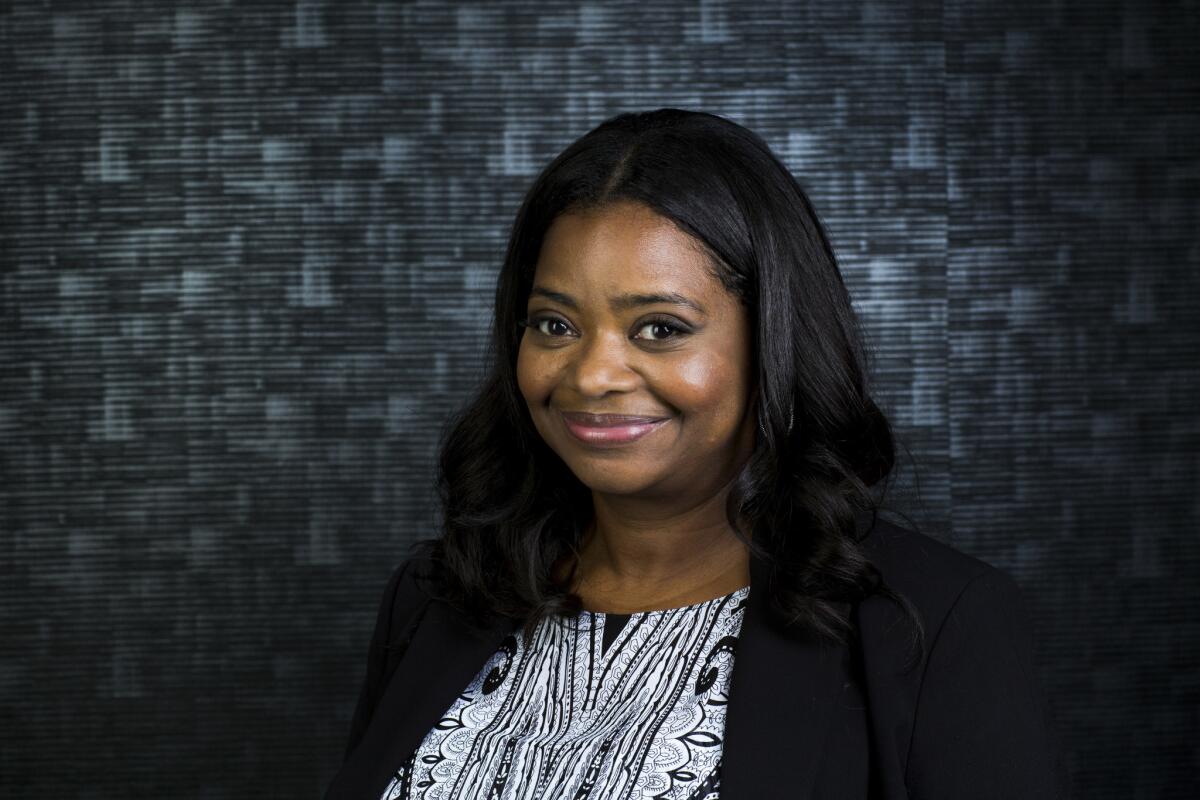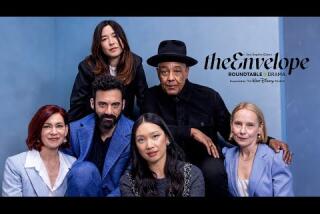Octavia Spencer can weather ‘Black and White’ clouds, shine elsewhere

Academy Award-winning actress Octavia Spencer was in Toronto to promote her new film, “Black and White.”
Reporting from Toronto — It’s a warm day, not yet 24 hours after “Black and White’s” afternoon premiere at the city’s annual film festival, and one of its stars, Octavia Spencer, emerges from the doorway — a study in black and white, warm and cool.
Black stilettos, black jeans, flowy black-and-white top, sleeves like gossamer wings tipped in royal blue. Not a statement, she assures, about fashion or the film, but chosen for comfort. The smile is infectious, unstudied familiar, having worked its way into a growing number of films and the hearts of a growing number of fans.
The clothes and the attitude represent a pragmatist’s approach. It will likely serve her well in the coming days. “Black and White” is starting to get some painful bruising following that first screening at the Toronto International Film Festival, writer-director Mike Binder bearing the brunt of it. Spencer and costar Kevin Costner, whose characters are fighting across the racial divide for custody of their biracial granddaughter, basked in a standing ovation at the premiere, but few hosannas for their work came in the days after. Too one-dimensional, too stereotypical has been the festival drumbeat.
It’s that double-edge of fame doing the cutting. Most of the coverage of festivals like this focuses on the hits, the promise, the beginnings, but disappointment is a steady companion in show business.
The expectations for Spencer since her Oscar win in 2012 are higher. Every stumble goes noted. Costner’s an old hand at riding out the turbulence; she’s still relatively new to the attention game. So times like these, a little level-headedness helps.
The workaday pragmatism comes in part from spending nearly 20 years in the trenches, taking on small roles and trying to hone her craft, before the supporting actress Oscar for her indelible turn as a sharp-tongued maid named Minny who bakes a mean pie in “The Help.” The Oscar changed everything and nothing.
“Life hasn’t changed, I have the same group of family and friends around me. Keeps me grounded,” she says. “But my career has changed by leaps and bounds. It’s like I’m suddenly in a place where I’m picking beautiful ripe fruit.”
The film roles are stacked up like planes on an LAX runway; fitting, since she calls L.A. home now.
The 44-year-old Alabama native also plays a recovering alcoholic on the Anna Farris/Allison Janney CBS sitcom “Mom.” Before the month is out, Spencer’s new TV drama series, “Red Band Society,” will premiere on Fox. It follows a collection of teens confined to a hospital ward for various ailments. Spencer plays the ward nurse.
Nurse, maid, single mother, aunt, grandmother, waitress, clerk — nearly all are roles that could slip into stereotype but for the firm grip of Spencer. Some are rooted in the country’s conversation about race, others are colorblind. By working her way inside, the actress consistently lifts them out of the afterthoughts they might have become.
As a single mother in “Fruitvale Station,” she’s frustrated by her son’s lack of ambition, enraged at his unnecessary death, insistent on everyone, including herself, taking responsibility. In Joon-ho Bong’s surrealistic “Snowpiercer” with Chris Evans and Tilda Swinton, she’s a fierce ghetto mother doing whatever is necessary to see that her child survives. In “Smashed,” she plays a food addict. A pet psychic in “Dinner for Schmucks.”
It’s hard to think of a character type she hasn’t played, including herself in a quick tart turn on Tina Fey’s “30 Rock.” She managed to squeeze in writing a children’s book, “Randi Rhodes, Ninja Detective.” That it’s about empowering kids might not surprise you. That its lead character is a redheaded white girl might.
Busy makes her content, hard work brings satisfaction. “When I hit 40, something shifted, I don’t want to waste another day. You never know how much time you’ll have. I never want to forget that.”
What I imagine she can’t forget either is the long, lean early years. Lots of credits, many little more than walk-ons starting in 1996, as a nurse caring for Sandra Bullock’s character in “A Time to Kill,” a teacher on an episode of the TV series “Moesha,” a woman in the elevator of the indie hit “Being John Malkovich,” a check-in girl in 2002’s “Spider-Man,” during the Tobey Maguire era.
That her breakthrough came from the circle of friends she keeps says as much about the person she is as about the talent she commands. In 2003, as a struggling actress in L.A., sharing the rent with another Southern hopeful, writer-director Tate Taylor, she met an aspiring novelist who’d grown up in Mississippi with Taylor.
Spencer and Kathryn Stockett hit it off immediately. So much so that the writer based the indomitable spirit and quick wit of a certain maid on her new friend for a book she was calling “The Help.” Taylor got rights to the book before it was published; Spencer got the role. And the rest, as they say, is Hollywood history.
When it comes to Spencer’s work now, if the connection is there, she will try to find a way. “When I pick up a script, I have to find the character. I can’t play it if I don’t believe it, don’t understand the journey, don’t want to go on the journey. And if I don’t, how can I bring a truth that you can believe, or feel?”
Humor speaks volumes. For all the grief and loss, levity frequently slips into “Black and White,” starting with the irony of the title. “I liked the metaphor of it immediately.”
She felt a bond with Rowena immediately too. The entrepreneurial Compton grandmother is going up against Costner’s Elliott, a well-heeled and whiskey-saturated attorney, for custody of their granddaughter Eloise (an angel-faced Jillian Estell). Rowena has steel, sass and compassion, languages Spencer is well-versed in. When it comes to making good use of a “I know what you’re doing” look, few are better at it than she is.
Still “Black and White” proves a challenge. What an actor reads on the page is rarely what we see on-screen. Things change, texture and tone go from abstract to concrete, the final result can elevate a film or be its undoing. The filmmaker’s “can’t we all get along” soft-soaping of the story line certainly made it more of a challenge for the actress to stand her ground, to keep Rowena this side of cliché.
It’s a close call, but the actress starts by giving Rowena dignity first, a sense of humor next, then a level of compassion and forgiveness on which the film ultimately turns.
The chance to work with Costner, though, is what ultimately ensured her involvement. “He is a generous actor, a generous man. A hard worker too, he does everything — produce, direct, act, write. He sees to the details, even small ones. I consider myself a hyphenate too, and I want to learn it all, do it all.” (At midweek, the film was still looking for a distribution deal, but Costner, one of the producers, has said he’s intent on getting it into theaters by year’s end.)
Is producing and directing coming soon?
She laughs that laugh, deep, unrestrained. “I have to look and learn a lot longer.”
When Spencer speaks of looking for a bond with each character she plays, one thinks of a scene in “Get on Up,” the under-appreciated but emotionally rich James Brown biopic.
It’s late night, and Aunt Honey, the brothel owner she plays who helped raise the future superstar, is reassuring young James. As Spencer delivers the words that he is special, that he will be somebody some day, you can hear echoes of the actress’ childhood in Montgomery, Ala.
The sixth of seven kids, her mama always told them to think big, to find work they could be proud of, that would sustain them.
Though acting didn’t quite fit the business model her mama had in mind, it has worked for Spencer. It has always been there too. Even as a child when she looked at her future and what she might do, acting was the answer.
“It’s who I am,” says Spencer, “what I am. I never had a doubt about that.”
More to Read
From the Oscars to the Emmys.
Get the Envelope newsletter for exclusive awards season coverage, behind-the-scenes stories from the Envelope podcast and columnist Glenn Whipp’s must-read analysis.
You may occasionally receive promotional content from the Los Angeles Times.







